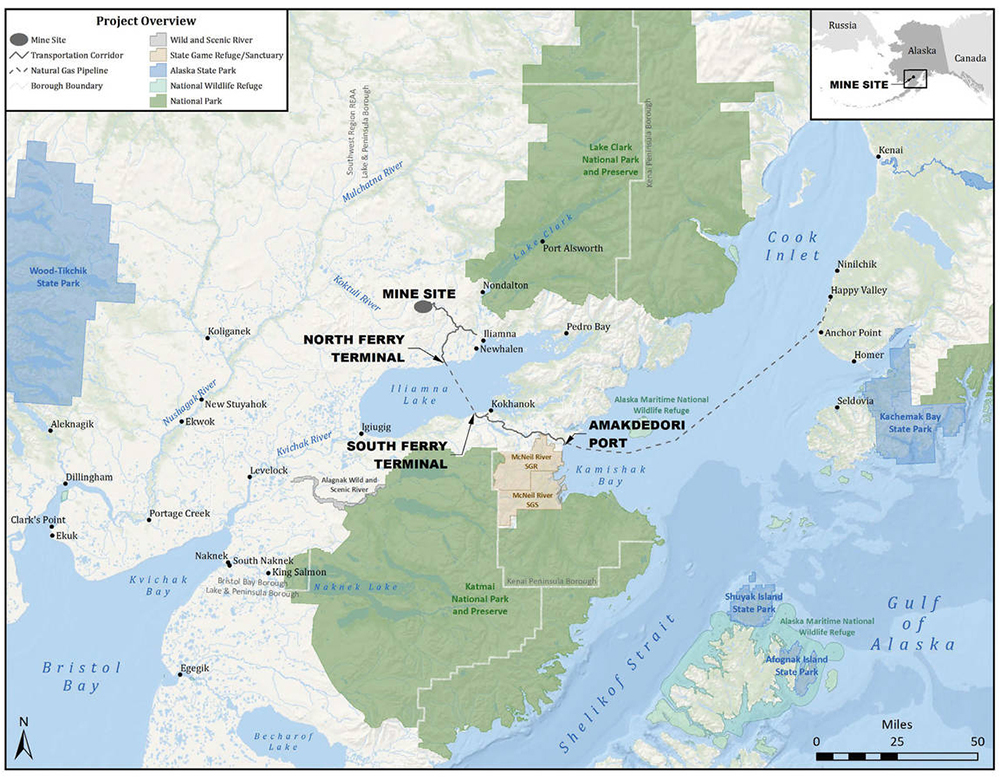
Over a dozen conservation entities have filed as intervenors in U.S. District Court in Anchorage in a lawsuit by a Canadian mining company seeking to overturn a federal decision on Clean Water Act safeguards that would prevent development of the proposed Pebble mine.
The intervenor litigants, who filed on May 17, contend that development of the copper, gold and molybdenum mine poses environmental danger to the region, its Alaska Native communities, resources, environment and economy.
“As businesses that rely on Bristol Bay and its salmon fisheries, we know just how important the EPA’s Clean Water Act protections are,” Lilani Dunn, executive director of the Bristol Bay Regional Seafood Development Association, said. “Bristol Bay is critical for providing high-quality, sustainable seafood to consumers around the world.”
“Preserving Bristol Bay and its pristine watershed is not just an environmental issue,” Michael Link, president/CEO of the Bristol Bay Economic Development Corp. said. Link described the Bristol Bay salmon fishery as an economic driver threatened until the EPA’s latest action stopped what he labeled a toxic mining project.
The legal battle over development of the Pebble mine on state land that abuts the Bristol Bay watershed dates back well over a decade. In 2010, six Alaska Native tribes in Bristol Bay petitioned the Environmental Protection Agency to protect the watershed from the proposed mine over concerns about its potential adverse impact on the world’s largest run of wild salmon and related impacts on wildlife and the overall environment.
Proponents, including a major Canadian mining company, contend that by using modern technology, the mine could operate for years in harmony with the salmon fishery, which is seen as critical to the economy and traditional Native culture in Southwest Alaska.
The Pebble Limited Partnership and its parent company, Northern Dynasty Minerals Ltd., a subsidiary of Vancouver mining group Hunter Dickinson Inc., filed two separate actions in March in U.S. District Court in Alaska.
The first seeks to vacate the EPA’s veto of development of the Pebble project, and the second contends that the agency’s decision constitutes an unconstitutional “taking” of property held by Northern Dynasty and the Pebble Partnership.
Northern Dynasty President and CEO Ronald Thiessen is also president and CEO of Hunter Dickinson. According to Northern Dynasty, the Pebble project is the world’s most significant undeveloped copper and gold resource.
On April 11, the state of Alaska filed its own lawsuit, asking the court to find the EPA’s order on state land in Bristol Bay unlawful. Alaska Atty. Gen. Treg Taylor called the EPA’s decision “an affront to the sovereignty of Alaska” that ignores state laws and regulatory programs that protect anadromous fish and other natural resources.
The state also argued that it has a constitutional responsibility to sustainably manage all of its natural resources.
Trustees for Alaska and Earthjustice filed the intervenor litigation collectively on behalf of Salmon State, Alaska Community Action on Toxics, Alaska Wilderness League, Alaska Wildlife Alliance, Cook Inletkeeper, Friends of McNeil River, Kachemak Bay Conservation Society, National Parks Conservation Association, National Wildlife Federation, Sierra Club, The Alaska Center, Wild Salmon Center, Center for Biological Diversity, Earthworks and Friends of the Earth.
Trout Unlimited, represented by the international law group Sheppard Mullin, filed as an intervenor separately.
Trout Unlimited Alaska Director Nelli Williams called Northern Dynasty’s lawsuit “another chapter in the Pebble Partnership’s ongoing efforts to circumvent science, the will of Alaskans and common sense.”
“The proposed Pebble mine is a bad idea today, just as it was decades ago,” Williams said.
